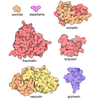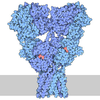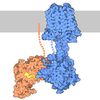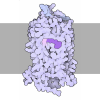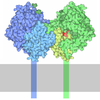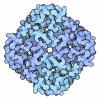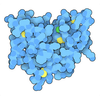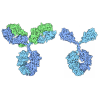[English] 日本語
 Yorodumi
Yorodumi- PDB-9avl: Structure of human calcium-sensing receptor in complex with Gi3 p... -
+ Open data
Open data
- Basic information
Basic information
| Entry | Database: PDB / ID: 9avl | ||||||
|---|---|---|---|---|---|---|---|
| Title | Structure of human calcium-sensing receptor in complex with Gi3 protein in nanodiscs | ||||||
 Components Components |
| ||||||
 Keywords Keywords | MEMBRANE PROTEIN / Calcium-sensing receptor / G-protein-coupled receptor / G protein / signal transduction | ||||||
| Function / homology |  Function and homology information Function and homology informationregulation of presynaptic membrane potential / bile acid secretion / chemosensory behavior / response to fibroblast growth factor / cellular response to peptide / cellular response to vitamin D / phosphatidylinositol-4,5-bisphosphate phospholipase C activity / negative regulation of adenylate cyclase activity / Class C/3 (Metabotropic glutamate/pheromone receptors) / calcium ion import ...regulation of presynaptic membrane potential / bile acid secretion / chemosensory behavior / response to fibroblast growth factor / cellular response to peptide / cellular response to vitamin D / phosphatidylinositol-4,5-bisphosphate phospholipase C activity / negative regulation of adenylate cyclase activity / Class C/3 (Metabotropic glutamate/pheromone receptors) / calcium ion import / regulation of potassium ion transmembrane transport / positive regulation of positive chemotaxis / GTP metabolic process / fat pad development / cellular response to hepatocyte growth factor stimulus / amino acid binding / branching morphogenesis of an epithelial tube / positive regulation of calcium ion import / positive regulation of vasoconstriction / regulation of calcium ion transport / positive regulation of macroautophagy / cellular response to low-density lipoprotein particle stimulus / anatomical structure morphogenesis / detection of calcium ion / Adenylate cyclase inhibitory pathway / JNK cascade / axon terminus / ossification / chloride transmembrane transport / response to ischemia / cellular response to glucose stimulus / G protein-coupled receptor binding / positive regulation of insulin secretion / G protein-coupled receptor activity / adenylate cyclase-inhibiting G protein-coupled receptor signaling pathway / vasodilation / integrin binding / adenylate cyclase-modulating G protein-coupled receptor signaling pathway / centriolar satellite / G-protein beta/gamma-subunit complex binding / intracellular calcium ion homeostasis / G beta:gamma signalling through PLC beta / Presynaptic function of Kainate receptors / Thromboxane signalling through TP receptor / Activation of G protein gated Potassium channels / Inhibition of voltage gated Ca2+ channels via Gbeta/gamma subunits / G-protein activation / G beta:gamma signalling through CDC42 / Prostacyclin signalling through prostacyclin receptor / Glucagon signaling in metabolic regulation / G beta:gamma signalling through BTK / ADP signalling through P2Y purinoceptor 12 / Glucagon-type ligand receptors / Adrenaline,noradrenaline inhibits insulin secretion / GDP binding / Vasopressin regulates renal water homeostasis via Aquaporins / Glucagon-like Peptide-1 (GLP1) regulates insulin secretion / G alpha (z) signalling events / ADP signalling through P2Y purinoceptor 1 / cellular response to catecholamine stimulus / ADORA2B mediated anti-inflammatory cytokines production / G beta:gamma signalling through PI3Kgamma / adenylate cyclase-activating dopamine receptor signaling pathway / Cooperation of PDCL (PhLP1) and TRiC/CCT in G-protein beta folding / GPER1 signaling / G-protein beta-subunit binding / cellular response to prostaglandin E stimulus / heterotrimeric G-protein complex / G alpha (12/13) signalling events / Thrombin signalling through proteinase activated receptors (PARs) / signaling receptor complex adaptor activity / presynaptic membrane / GTPase binding / Ca2+ pathway / fibroblast proliferation / midbody / High laminar flow shear stress activates signaling by PIEZO1 and PECAM1:CDH5:KDR in endothelial cells / G alpha (i) signalling events / cellular response to hypoxia / G alpha (s) signalling events / phospholipase C-activating G protein-coupled receptor signaling pathway / basolateral plasma membrane / G alpha (q) signalling events / vesicle / transmembrane transporter binding / Extra-nuclear estrogen signaling / positive regulation of ERK1 and ERK2 cascade / ciliary basal body / apical plasma membrane / G protein-coupled receptor signaling pathway / lysosomal membrane / cell division / focal adhesion / neuronal cell body / GTPase activity / positive regulation of cell population proliferation / calcium ion binding / synapse / centrosome / positive regulation of gene expression Similarity search - Function | ||||||
| Biological species |  Homo sapiens (human) Homo sapiens (human) | ||||||
| Method | ELECTRON MICROSCOPY / single particle reconstruction / cryo EM / Resolution: 3.8 Å | ||||||
 Authors Authors | Zuo, H. / Park, J. / Frangaj, A. / Ye, J. / Lu, G. / Manning, J.J. / Asher, W.B. / Lu, Z. / Hu, G. / Wang, L. ...Zuo, H. / Park, J. / Frangaj, A. / Ye, J. / Lu, G. / Manning, J.J. / Asher, W.B. / Lu, Z. / Hu, G. / Wang, L. / Mendez, J. / Eng, E. / Zhang, Z. / Lin, X. / Grasucci, R. / Hendrickson, W.A. / Clarke, O.B. / Javitch, J.A. / Conigrave, A.D. / Fan, Q.R. | ||||||
| Funding support |  United States, 1items United States, 1items
| ||||||
 Citation Citation |  Journal: Nature / Year: 2024 Journal: Nature / Year: 2024Title: Promiscuous G-protein activation by the calcium-sensing receptor. Authors: Hao Zuo / Jinseo Park / Aurel Frangaj / Jianxiang Ye / Guanqi Lu / Jamie J Manning / Wesley B Asher / Zhengyuan Lu / Guo-Bin Hu / Liguo Wang / Joshua Mendez / Edward Eng / Zhening Zhang / ...Authors: Hao Zuo / Jinseo Park / Aurel Frangaj / Jianxiang Ye / Guanqi Lu / Jamie J Manning / Wesley B Asher / Zhengyuan Lu / Guo-Bin Hu / Liguo Wang / Joshua Mendez / Edward Eng / Zhening Zhang / Xin Lin / Robert Grassucci / Wayne A Hendrickson / Oliver B Clarke / Jonathan A Javitch / Arthur D Conigrave / Qing R Fan /   Abstract: The human calcium-sensing receptor (CaSR) detects fluctuations in the extracellular Ca concentration and maintains Ca homeostasis. It also mediates diverse cellular processes not associated with Ca ...The human calcium-sensing receptor (CaSR) detects fluctuations in the extracellular Ca concentration and maintains Ca homeostasis. It also mediates diverse cellular processes not associated with Ca balance. The functional pleiotropy of CaSR arises in part from its ability to signal through several G-protein subtypes. We determined structures of CaSR in complex with G proteins from three different subfamilies: G, G and G. We found that the homodimeric CaSR of each complex couples to a single G protein through a common mode. This involves the C-terminal helix of each Gα subunit binding to a shallow pocket that is formed in one CaSR subunit by all three intracellular loops (ICL1-ICL3), an extended transmembrane helix 3 and an ordered C-terminal region. G-protein binding expands the transmembrane dimer interface, which is further stabilized by phospholipid. The restraint imposed by the receptor dimer, in combination with ICL2, enables G-protein activation by facilitating conformational transition of Gα. We identified a single Gα residue that determines G and G versus G selectivity. The length and flexibility of ICL2 allows CaSR to bind all three Gα subtypes, thereby conferring capacity for promiscuous G-protein coupling. | ||||||
| History |
|
- Structure visualization
Structure visualization
| Structure viewer | Molecule:  Molmil Molmil Jmol/JSmol Jmol/JSmol |
|---|
- Downloads & links
Downloads & links
- Download
Download
| PDBx/mmCIF format |  9avl.cif.gz 9avl.cif.gz | 425 KB | Display |  PDBx/mmCIF format PDBx/mmCIF format |
|---|---|---|---|---|
| PDB format |  pdb9avl.ent.gz pdb9avl.ent.gz | Display |  PDB format PDB format | |
| PDBx/mmJSON format |  9avl.json.gz 9avl.json.gz | Tree view |  PDBx/mmJSON format PDBx/mmJSON format | |
| Others |  Other downloads Other downloads |
-Validation report
| Summary document |  9avl_validation.pdf.gz 9avl_validation.pdf.gz | 1.1 MB | Display |  wwPDB validaton report wwPDB validaton report |
|---|---|---|---|---|
| Full document |  9avl_full_validation.pdf.gz 9avl_full_validation.pdf.gz | 1.2 MB | Display | |
| Data in XML |  9avl_validation.xml.gz 9avl_validation.xml.gz | 65.1 KB | Display | |
| Data in CIF |  9avl_validation.cif.gz 9avl_validation.cif.gz | 97.1 KB | Display | |
| Arichive directory |  https://data.pdbj.org/pub/pdb/validation_reports/av/9avl https://data.pdbj.org/pub/pdb/validation_reports/av/9avl ftp://data.pdbj.org/pub/pdb/validation_reports/av/9avl ftp://data.pdbj.org/pub/pdb/validation_reports/av/9avl | HTTPS FTP |
-Related structure data
| Related structure data |  43908MC  9asbC  9avgC 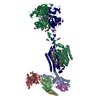 9axfC 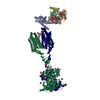 9ayfC C: citing same article ( M: map data used to model this data |
|---|---|
| Similar structure data | Similarity search - Function & homology  F&H Search F&H Search |
- Links
Links
- Assembly
Assembly
| Deposited unit | 
|
|---|---|
| 1 |
|
- Components
Components
-Protein , 1 types, 2 molecules QR
| #1: Protein | Mass: 102864.617 Da / Num. of mol.: 2 Source method: isolated from a genetically manipulated source Details: The CaSR construct consists of residues 1-903 and a Flag tag inserted after the signal peptide. Source: (gene. exp.)  Homo sapiens (human) / Gene: CASR, GPRC2A, PCAR1 / Cell line (production host): HEK293 GnTI- / Production host: Homo sapiens (human) / Gene: CASR, GPRC2A, PCAR1 / Cell line (production host): HEK293 GnTI- / Production host:  Homo sapiens (human) / References: UniProt: P41180 Homo sapiens (human) / References: UniProt: P41180 |
|---|
-Guanine nucleotide-binding protein ... , 3 types, 3 molecules ABG
| #2: Protein | Mass: 40584.156 Da / Num. of mol.: 1 / Mutation: S47N, G203A, E245A, A326S Source method: isolated from a genetically manipulated source Details: G(i3)alpha contains four dominant negative mutations, S47N, G203A, E245A, and A326S Source: (gene. exp.)  Homo sapiens (human) / Gene: GNAI3 / Cell line (production host): HEK293 GnTI- / Production host: Homo sapiens (human) / Gene: GNAI3 / Cell line (production host): HEK293 GnTI- / Production host:  Homo sapiens (human) / References: UniProt: P08754 Homo sapiens (human) / References: UniProt: P08754 |
|---|---|
| #3: Protein | Mass: 38367.969 Da / Num. of mol.: 1 Source method: isolated from a genetically manipulated source Details: GNB2 has N-terminal Flag tag inserted after the initial Met. Source: (gene. exp.)  Homo sapiens (human) / Gene: GNB2 / Cell line (production host): HEK293 GnTI- / Production host: Homo sapiens (human) / Gene: GNB2 / Cell line (production host): HEK293 GnTI- / Production host:  Homo sapiens (human) / References: UniProt: P62879 Homo sapiens (human) / References: UniProt: P62879 |
| #4: Protein | Mass: 7861.143 Da / Num. of mol.: 1 Source method: isolated from a genetically manipulated source Source: (gene. exp.)  Homo sapiens (human) / Gene: GNG2 / Cell line (production host): HEK293 GnTI- / Production host: Homo sapiens (human) / Gene: GNG2 / Cell line (production host): HEK293 GnTI- / Production host:  Homo sapiens (human) / References: UniProt: P59768 Homo sapiens (human) / References: UniProt: P59768 |
-Sugars , 2 types, 8 molecules 
| #5: Polysaccharide | 2-acetamido-2-deoxy-beta-D-glucopyranose-(1-4)-2-acetamido-2-deoxy-beta-D-glucopyranose Source method: isolated from a genetically manipulated source #6: Sugar | ChemComp-NAG / |
|---|
-Non-polymers , 6 types, 14 molecules 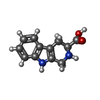
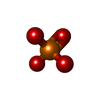


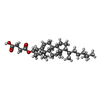




| #7: Chemical | | #8: Chemical | #9: Chemical | ChemComp-CA / #10: Chemical | #11: Chemical | ChemComp-Y01 / | #12: Chemical | ChemComp-A1AF7 / ( | Mass: 749.007 Da / Num. of mol.: 1 / Source method: obtained synthetically / Formula: C40H77O10P |
|---|
-Details
| Has ligand of interest | N |
|---|---|
| Has protein modification | Y |
-Experimental details
-Experiment
| Experiment | Method: ELECTRON MICROSCOPY |
|---|---|
| EM experiment | Aggregation state: PARTICLE / 3D reconstruction method: single particle reconstruction |
- Sample preparation
Sample preparation
| Component | Name: Human CaSR in complex with Gi3 protein / Type: COMPLEX / Entity ID: #1-#4 / Source: RECOMBINANT | |||||||||||||||||||||||||||||||||||
|---|---|---|---|---|---|---|---|---|---|---|---|---|---|---|---|---|---|---|---|---|---|---|---|---|---|---|---|---|---|---|---|---|---|---|---|---|
| Molecular weight | Value: 0.288 MDa / Experimental value: NO | |||||||||||||||||||||||||||||||||||
| Source (natural) | Organism:  Homo sapiens (human) Homo sapiens (human) | |||||||||||||||||||||||||||||||||||
| Source (recombinant) | Organism:  Homo sapiens (human) / Cell: HEK293 GnTI- Homo sapiens (human) / Cell: HEK293 GnTI- | |||||||||||||||||||||||||||||||||||
| Buffer solution | pH: 7.5 | |||||||||||||||||||||||||||||||||||
| Buffer component |
| |||||||||||||||||||||||||||||||||||
| Specimen | Conc.: 3.5 mg/ml / Embedding applied: NO / Shadowing applied: NO / Staining applied: NO / Vitrification applied: YES | |||||||||||||||||||||||||||||||||||
| Specimen support | Grid material: GOLD / Grid mesh size: 300 divisions/in. / Grid type: Quantifoil R0.6/1 | |||||||||||||||||||||||||||||||||||
| Vitrification | Instrument: FEI VITROBOT MARK IV / Cryogen name: ETHANE / Humidity: 100 % / Chamber temperature: 277 K Details: The sample was blotted for 6s before plunge-frozen. |
- Electron microscopy imaging
Electron microscopy imaging
| Experimental equipment |  Model: Titan Krios / Image courtesy: FEI Company |
|---|---|
| Microscopy | Model: FEI TITAN KRIOS |
| Electron gun | Electron source:  FIELD EMISSION GUN / Accelerating voltage: 300 kV / Illumination mode: FLOOD BEAM FIELD EMISSION GUN / Accelerating voltage: 300 kV / Illumination mode: FLOOD BEAM |
| Electron lens | Mode: BRIGHT FIELD / Nominal magnification: 105000 X / Nominal defocus max: 1800 nm / Nominal defocus min: 1000 nm / Cs: 2.7 mm / C2 aperture diameter: 100 µm / Alignment procedure: COMA FREE |
| Specimen holder | Cryogen: NITROGEN / Specimen holder model: FEI TITAN KRIOS AUTOGRID HOLDER / Temperature (max): 100 K |
| Image recording | Average exposure time: 2.5 sec. / Electron dose: 70.14 e/Å2 / Film or detector model: GATAN K3 BIOQUANTUM (6k x 4k) / Num. of grids imaged: 2 / Num. of real images: 16504 |
| EM imaging optics | Energyfilter name: GIF Bioquantum / Energyfilter slit width: 20 eV |
| Image scans | Width: 5760 / Height: 4092 |
- Processing
Processing
| EM software |
| ||||||||||||||||||||||||||||||||||||
|---|---|---|---|---|---|---|---|---|---|---|---|---|---|---|---|---|---|---|---|---|---|---|---|---|---|---|---|---|---|---|---|---|---|---|---|---|---|
| CTF correction | Type: PHASE FLIPPING AND AMPLITUDE CORRECTION | ||||||||||||||||||||||||||||||||||||
| Particle selection | Num. of particles selected: 2792317 | ||||||||||||||||||||||||||||||||||||
| Symmetry | Point symmetry: C1 (asymmetric) | ||||||||||||||||||||||||||||||||||||
| 3D reconstruction | Resolution: 3.8 Å / Resolution method: FSC 0.143 CUT-OFF / Num. of particles: 55985 / Symmetry type: POINT | ||||||||||||||||||||||||||||||||||||
| Atomic model building | Protocol: FLEXIBLE FIT / Space: REAL | ||||||||||||||||||||||||||||||||||||
| Atomic model building | 3D fitting-ID: 1 / Source name: PDB / Type: experimental model
| ||||||||||||||||||||||||||||||||||||
| Refine LS restraints |
|
 Movie
Movie Controller
Controller


























 PDBj
PDBj